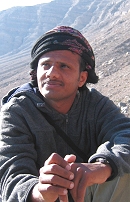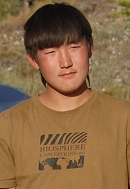Building capacity and generating employment opportunities for local people is an important part of what we do. Here are just a few examples of how this works in the field:
Building capacity and generating employment opportunities for local people is an important part of what we do. Here are just a few examples of how this works in the field:
On all our expeditions, we offer placements for local people, whether they are students, local NGO or government employees or committed individuals. Since its inception in 2012, our placement programme has hosted over 100 local people on all expeditions across the world. Outcomes are community-based conservation and education programmes, the creation of local conservation NGOs, career changes and employment in conservation jobs gained.

"The Altai expedition was the best thing that happened to me for my career development. I had waited for a long time to get to this part of the Altai and the expedition gave me the opportunity. Once I saw Chuyskaya Steppe and the great Chikhachova Ridge, I loved them with all my heart, and I became familiar with that place. Next week I will return there, making some bird observation. And from next summer onwards, I start guiding bird-watching tours in that area with Rubythroat Birding Tours. I have found the job of my dreams! And I have to thank you, Biosphere Expeditions, for it!"
Elena Shnayder, Russia
More testimonials and information about our placement programme
More placement testimonial videos
Through our placement programme for local people and other activities, we have helped build capacity, found local conservation NGOs (for example in Oman, the Maldives and Malaysia) and many other activities as below:

We have co-financed field research stations, for example in Namibia and Peru. These research stations are used by research bodies year-round and function as important centres for conservation, providing training and a hub for researchers, as well as employment for the local community.

“I work at the Hanyini Research Station in the East Caprivi. My job is to run the station so that citizen scientists from Biosphere Expeditions can concentrate on research work that helps to protect the livestock in our communities and to manage predators. This is my first job and I am very grateful as there is little work in our area. I am also very grateful for the work that the research assistants are doing. Since their arrival I haven’t lost any cattle to lions and hyaenas. My cattle are very important to me and for my family. Thank you for your support.”
Simon Naha, Caprivi delta, Namibia.

"My name is Aldo Ramirez Mejia. I am 21 years old and from the local community at Lake Sandoval. While I finished my studies in Puerto Maldonado, I worked with the Tambopata Macaw Project studying macaws and claylicks, which is supported by Biosphere Expeditions. Traditionally, my family has fished, farmed and hunted, but thanks to Biosphere Expeditions and its ecotourism and conservation opportunities, I have been able to dedicate my time to my interest with the local wildlife with which I grew up, rather than hunting it. Thank you very much."
Aldo Ramirez Mejia, Lake Sandoval community, Peru.

"My uncle used to work as a look-out for the whaling industry, spotting whales for the whalers and he taught me how to spot them. With whaling now banned around the Azores, I can do this job of spotting whales for Biosphere Expeditions and its research teams. It's a great way to use my skills, keeping them alive for future generations and helping the whales." Miguel Vargas, Cedros, Faial Island, Azores.

"I was born and raised in Cayo Cochino Menor. The island I once played on as a boy, I now work to protect as a boat captain for the Honduran Coral Reef Foundation. I know these waters like the back of my hand and enjoy sharing our marine treasures with the team members from Biosphere Expeditions. I am a certified rescue diver, in large part inspired by watching the teams work here. I am proud of my country and these islands and feel very lucky that researchers from Biosphere Expeditions are helping to conduct research that helps in the conservation of the area. Thank you!"
Alex Solis, Cayos Cochinos Islands, Honduras.

"My work on Arabian leopard conservation began with the Oman Office for Conservation of the Environment in 2002 and since 2006 I have been assisting Biosphere Expeditions in survey work on the Arabian leopard and prey species in Oman. Trhough my work with Biosphere Expeditions, I have had the chance to meet people from different cultures from all over the world and I also gained invaluable information & experience on how to conduct conservation research by working with experienced scientists from Biosphere Expeditions. Through the Office for Conservation I am now studying for a conservation degree in the UK, something I always dreamed of. When I finish my studies I look forward to continuing my work with the conservation of the Arabian leopard.”
Hadi al Hikmani, Dhofar, Oman.

"My name is Emil Respaevich Sanzarakov and I live in the village of Kurai in the Republic of Altai. I am a student at school and help my father look after sheep, goats and cows. Instead of hanging around in the village with my friends during the summer holidays, I now work for Biosphere Expeditions, helping with the running of base camp and guiding in the mountains. The work helps me to see and learn about my country as I do not normally have the opportunity to travel and see places. I enjoy meeting people from other countries and improving my English. The money I earn is important for me to help support my family and also to feel independent. When I leave school, I hope to go to university; I also hope to continue working with Biosphere during the holidays."
Emil Respaevich Sanzarakov, Kurai village, Republic of Altai.